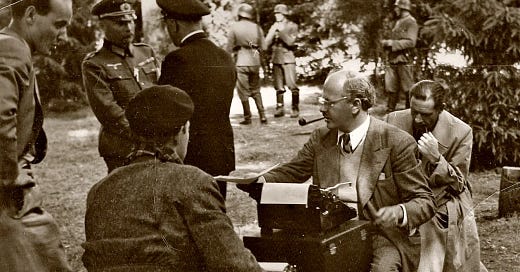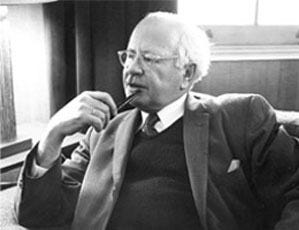Who was William L. Shirer? — part 1
As we begin to read "The Rise and Fall of the Third Reich," its author, the famed American foreign correspondent, deserves a quick look.
At the beginning of next week, we’ll be starting William L. Shirer’s The Rise and Fall of the Third Reich. From January 20 to 26, we’ll read Chapter 1: Birth of the Third Reich and Chapter 2: Birth of the Nazi Party.
For those of you with busy schedules, the reading comes out to only around 50 pages/week. Our pace throughout the entire reading group will be about 10 pages/day.
Currently, the plan is for me to write a post here for each chapter. I strongly encourage thoughts and questions in the comments. But I’d also like to offer a chance for discussion in a Zoom call for those who are interested. The best time would likely be on Saturday morning (so January 25 for next week). If you’re interested, then please sound off in the comments or contact me privately.
So with that housekeeping out of the way, let’s turn to the subject of this post: the early life of William L. Shirer. If you are going to invest all this time reading his doorstop of a book, then you ought to know a little bit about him.
What I’m writing here comes from the first volume of Shirer’s memoirs: 20th Century Journey: The Start (1904-1930), as well as Ken Cuthbertson’s 2015 biography A Complex Fate: William L. Shirer and the American Century.
It also draws from my own historical research about American journalism in Europe. In the 1930s, Shirer spent half a year working at the European Edition of the New York Herald Tribune, which in 1966 became the International Herald Tribune, the main focus of my PhD dissertation.
Shirer was born in 1904 in Chicago, a Midwesterner of German and Welsh-English stock. When his father died in 1913, the family retreated to his wife’s much more parochial hometown in Iowa. The next year, World War I broke out. As he wrote in his memoir, “The world itself died with my father in 1913, or shortly thereafter, for the next year there came the Great War, which left the world my father had known in shambles.”
Shirer, of course, wasn’t the only one whose world was shaken by the war. World War I shattered the old imperial, aristocratic order, leaving unimaginable destruction in its wake and opening up new possibilities heretofore unimaginable.
For a young Austrian lance corporal in the trenches of the Western Front, it sowed the seeds that later emerged as the Third Reich.
For Shirer, it seems mostly to have given him the travel bug.
In that era of Prohibition and Main Street mores, Shirer wanted to get the hell out of Dodge and see the world. He has a middling student with only average grades (that was back in the misty past, though, when C’s actually meant “average”). But he loved to write. At Coe College in Cedar Rapids, Iowa, he wrote for the student paper. To help pay for his tuition given his family’s financial situation, he also got a job editing the sports section of the local Cedar Rapids paper, the Daily Republican.
Once he graduated, Shirer and a friend decided to spend the summer in Europe. They traveled across the Atlantic on a cattle boat, shoveling manure each day to pay their way. After a magical summer, Shirer dreaded a return home to the small town Midwest. So he scoured Paris for jobs.
On the last day before his departure, he ended up getting one at the Paris edition of the Chicago Tribune. He ended up staying with the Tribune for almost a decade, moving up from copy editor to local reporter where he covered Charles Lindbergh’s arrival in Paris and visits by American sports stars and celebrities. Then he became a roving foreign correspondent covering interwar political turmoil across Europe and the anti-colonial movements in India.
However, for much of that time, because of his background in sports writing, Shirer was regularly assigned to sporting events. So in 1928, for instance, he was sent to Rome for the wedding of American heavyweight boxer Gene Tunney. Of course, Shirer had little interest in Tunney, his boxing exploits, or his bride-to-be. He spent most of the time speaking with the groom’s best man, the novelist and playwright Thornton Wilder, who had won the Pulitzer Prize that year.
Shirer wanted to be a writer. Not a journalist. An author. In this, he was far from alone. The American who journeys to Paris to become a writer is a type. A cliché. But back in the 1920s, it wasn’t a cliché. Hemingway, who became the archetype, had only just succeeded in moving from journalism to novels with the success of his 1926 novel The Sun Also Rises. Shirer, like so many others, aspired to follow in Hemingway’s footsteps. Unfortunately, Shirer’s big book didn’t come until over three decades later.
During his time with the Chicago Tribune, Shirer traveled all over Europe for work and met some fascinating figures. In Paris, he spent time with the painter Grant Wood, the unstable writer genius F. Scott Fitzgerald, and his hero Ernest Hemingway. In Vienna he met Sinclair Lewis and his journalist wife Dorothy Thompson. In Italy, he covered the Vatican and Mussolini’s rise, comparing his oratory to William Jennings Bryan and Billy Sunday, whom he had observed in the Midwest. In the United Kingdom, he dined with Aneurin Bevan, who after World War II would craft the National Health Service. In Berlin, he commiserated about seeming career dead ends with George Kennan, who was studying Russian culture and civilization. (Two decades before his famous memo that crystallized the Cold War, Kennan was uncertain if he wanted to keep going in the State Department, just as Shirer wasn’t sure about journalism.)
Shirer even traveled to India, where became close with Gandhi, as he peacefully militated against the British empire. If you’ve seen Richard Attenborough’s 1982 biopic Gandhi, the American journalist character played by Martin Sheen is largely based on William Shirer. On one of his trips to British India, Shirer also struck up a friendship with the Afghani prince Mohammed Zahir Khan, because they both spoke French. He ended up covering the coronation of his father for the Chicago Tribune.
In addition to being forced to cover stories he considered trivial, a constant source of irritation for Shirer were the right-wing politics of his boss, the longtime owner and publisher of the Chicago Tribune Colonel McCormick. The politics of Shirer were what we might classify as left-liberal. Shirer was neither a fascist nor a communist during those interwar years, but between the two sides, there was a clear worse option.
From Shirer’s perspective, the right-wing—including his boss, Colonel McCormick—had made the Bolsheviks into too much of a bogeyman. Shirer disagreed firmly with his boss’s assertion that “the Reds were taking over Washington.” A series of conflicts, many based around this disagreement, ultimately led to Shirer being fired from the Chicago Tribune, leaving him with a pregnant wife and no job prospects in Vienna in the middle of the Great Depression. He and his wife moved to Spain, where living costs were cheaper and tried to regroup.
In 1933, Shirer was saved once again by an American newspaper in Paris. This time he was hired by Eric Hawkins, the longtime managing editor of the European Edition of the Herald Tribune. Unfortunately, though the job was just on the copy desk, which was a huge demotion for Shirer after his adventurous days as a roving foreign correspondent. He only lasted seven months before getting a job at UNS, one of the wire services for the Hearst chain of American newspapers. Shirer was immediately sent to Berlin, since he spoke German.
It was 1934. The previous year, the Weimar Republic had ceased to exist. A relatively unknown far-right agitator had somehow taken power and declared the start of a new era for the German-speaking peoples. Everyone in the United States (or at least those Americans who cared about foreign news) wanted to know what was going on in Berlin.
A few years later, as the war began, Shirer rose to fame broadcasting live from Berlin on CBS radio…
Stay tuned. We’ll pick up the biography of Shirer in a few weeks, when Shirer’s book reaches 1934.





